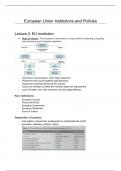European Union Institutions and Policies
Lecture 2: EU Institution
● Right of initiative: The European Commission is responsible for planning, preparing
and proposing new European legislation
- Commision only proposes, never takes decisions.
- Parliament and council together take decisions
- Parliament is directly elected by EU citizens
- Council of ministers is where the member states are represented
- court of auditor, see if the members use the budget efficient-
Key institutions
- European Council
- Council of the EU
- European Commission
- European Parliament
- Court of Justice
Separation of powers
- trias politica, uitvoerende; wetgevende en rechtsprekende macht
- executive, legislative, judicial, control
,The European Council
- where the heads of governments are represented
- heads of government (mark rutte) vs head of states (willempie)
Responsibilities:
- providing political directions
- problem solver en ultimate arbiter
- treaty revisions
- major appointments (eg. choosing president of european commission)
Ursula von der Leyen is the president of the european commision
- Elections were done behind closed doors → not democratic!
- European parliament: Spitzenkandidaten
- different groups are representing the voting and opinion of their group
(democrats, greens, socialists, conservationists etc…)
Council presidency
- Presiding and representing EU council
- 2.5 years period, can be extended once
- current president: Charles Michel
High Representative
- Is member of both the council and the commission
- external action service, involved in big decisions
- can only coordinate between member states
The Council of the EU
- intergovernmental, where diplomacy takes places, where governments negotiate and
make plans with each other
- sends civil servants
- always meets in a different constellation
- There are different councils, councils of ministers of agriculture, finance,
health etc…
Main tasks of council
- legislative task: legislator
- Executive tasks: external relations, inc. security and defense, enlargement
- about contact with outside europe and about new candidates or full
membership of candidates
- one of the two decisionmakers; together with the parliament
- Common EU policy, council together with parliament make decisions about this
, The European Commission
- Supranational institution: no representatives of nations
- Everyone needs to represent the European interests and not the national interest.
- headed by college of commissioners, appointed by MSs: every member state had
one commissioner
- Operates like nation governments
- has different ministries spread through europe
Tasks:
- Preparing and initiating legislation: comes out with proposals for new laws (only
institution that can propose)
- Implementing policies
- External representation
- Guardian of the treaties: check on the member states of ze zich aan de EU principles
houden
Two big priorities:
- Green deal: strategies, law proposals, policies
- Digitalisation
Commission has agencies die door europa de tasks uitvoeren, adviezen geven en informatie
verzamelen (EUROPOL)
The European Parliament
- supranational
- directly elected by EU citizens
- budgetary powers: right of approval (together with the council of the EU)
- proposed by european commission
- legislative powers: co-decision or advise
- scrutiny of the executive: right of information (checking on the executive on the
commission, it can investigate a commision and submit court of justice
- appointment and dismissal of commision (het kan een hele commissie dismissen als
deze bijv corrupt is)
- → appoint the European Commission
Political parties and EP
- Domestic political parties (e.g. VVD, CDU, Lega)
- Political groups: coalition between elected MEPs in the EP (the Greens)
- Are not attached to a country but to a political affiliation
- European political parties: associations between domestic political parties, operate
outside of EP (VOLT)




